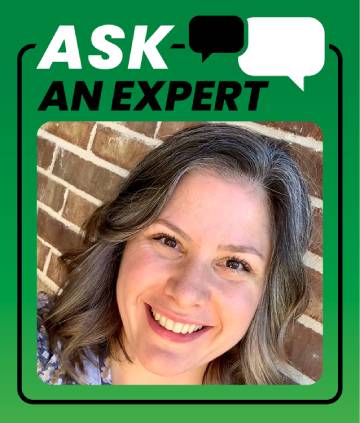Thursday, January 7, 2021
 UNT System HR is bringing UNT World experts directly to you with this periodic and
always timely installation called "Ask An Expert." So, let's ask...
UNT System HR is bringing UNT World experts directly to you with this periodic and
always timely installation called "Ask An Expert." So, let's ask...
EXPERT: Danielle Gemoets, Registered Dietitian, UNT Student Health and Wellness Center
EXPERTISE: Food and nutrition
Danielle has called UNT home for seven of her 11 years as a Registered Dietitian. She helps students discover their health goals and works collaboratively to empower them to live their best lives. She loves making confusing nutrition topics feel simple, flexible and easy to apply to everyday life. And, goodness knows, over these stressful last 10 months, it's been harder than ever to maintain a healthy diet. Click the button below to get some helpful advice to get back on track and feeling great.
Q: My eating has looked a lot different since COVID-19 started, working from home,
the added stress and now the holidays. How do I “reset?”
Danielle: Whether you’re someone who sets New Year’s resolutions and goals or simply turns
the page on your calendar, it’s hard to escape the messaging around being a “healthier”
or “better” version of yourself. As we all endured the punches 2020 threw, normal
routines went out the window. If you experienced a change in eating during this highly
stressful and change-filled time, it’s perfectly OK and completely understandable!
Be kind to yourself and explore things that are and aren’t working for you with curiosity,
but not criticism. To me, a “reset” generally means following a restrictive eating
or exercise plan, which just isn’t sustainable. It might produce some short-term changes,
but will likely leave you feeling deprived, guilty and frustrated in the end. Instead,
ask questions like, “I don’t have a lot of energy in the afternoons, I wonder why
that is?
Would I benefit from a satisfying and filling snack?” Or, “I’m noticing that I’m ravenous by the time I get to dinner and feel extremely full after I eat; am I giving myself opportunities to eat every 3-4 hours during the day so my hunger doesn’t build to a place where I’m extremely hungry?”
Q: There are so many diets out there -- Keto, Atkins, low-carb, intermittent fasting,
etc., etc. -- do you recommend a specific diet?
Danielle: When people use the term “diet,” they’re usually referring to a particular health
or weight-loss plan. Simply put, diets don’t work. Research supports this and many
people can tell tales of being “on” and “off” of various plans that once promised
to be the solution to health. The diet industry is clever and continually shifts to
try and hook people and play on our fears. There’s a lot of money to be made in the
world of dieting (it’s a multi-billion dollar industry!), so there is a huge interest
in keeping people curious. With that in mind, you don’t have to feel guilty if you
have been (or are currently) on a diet. Here’s the thing, nutrition isn’t one size
fits all, and different things work for different people. We all have various food
preferences, schedules, cooking abilities and health concerns. The best “diet” is
one that honors your body’s innate needs for hunger and satisfaction, provides predictable
eating times, honors your food preferences, is flexible and takes into consideration
any health concerns you have. Now, making that happen can sound like a huge undertaking,
but I promise you it’s worth it and can help you to achieve mental and physical health.
I’ve listed some resources below (in the answer to my last question) that will give
you some guidance on where to start.
Q: I’m busy and don’t have a lot of time to cook. How can I eat healthy meals?
Danielle: There are a lot of great convenience products available that can be fantastic time
savers. Pre-cooked meats (deli meat, fajita steak, chicken breast, rotisserie chicken,
etc.), canned tuna or salmon, canned beans, peanut butter, nuts, hummus, eggs, pre-chopped
fresh produce (salad, vegetables or fruit), frozen or canned produce, and quick cooking
grains (rice, quinoa, oats, etc.) are all great meal starters or additions. Meals
that don’t require cooking or that can be heated in the microwave are great to have
on hand when time is limited. Don’t forget that things like sandwiches, wraps, burritos,
quesadillas or “snack boxes” (with a combination of items like hummus, peanut butter,
nuts, crackers, pretzels, veggies or fruit) can make a great, balanced meal option.
If your budget allows for it, there are also a variety of fresh and frozen entree
and meal starter kits that can take a lot of the thought and hassle out of meal planning.
Q: What are some reliable nutrition resources?
Danielle: Working with a Registered Dietitian is a great option if you have a health condition
or are looking for individualized guidance. If you have health insurance, contact
your insurance company to see what services are covered and get a list of contracted
providers. You can also visit https://eatright.org and select “Find an Expert” to see a list of Registered Dietitians in your area.
If you prefer something you can explore on your own, I highly recommend "Intuitive
Eating: A Revolutionary Anti-Diet Approach" (4th edition) or "The Intuitive Eating
Workbook" by Evelyn Tribole, MS, RDN and Elyse Resch, MS, RDN. These are both fantastic
resources for anyone who is tired of dieting and wants to focus on overall health
while learning to trust their body and make peace with food. For those with children,
The Ellyn Satter Institute (https://www.ellynsatterinstitute.org/) has a wealth of resources and books that are incredibly helpful.